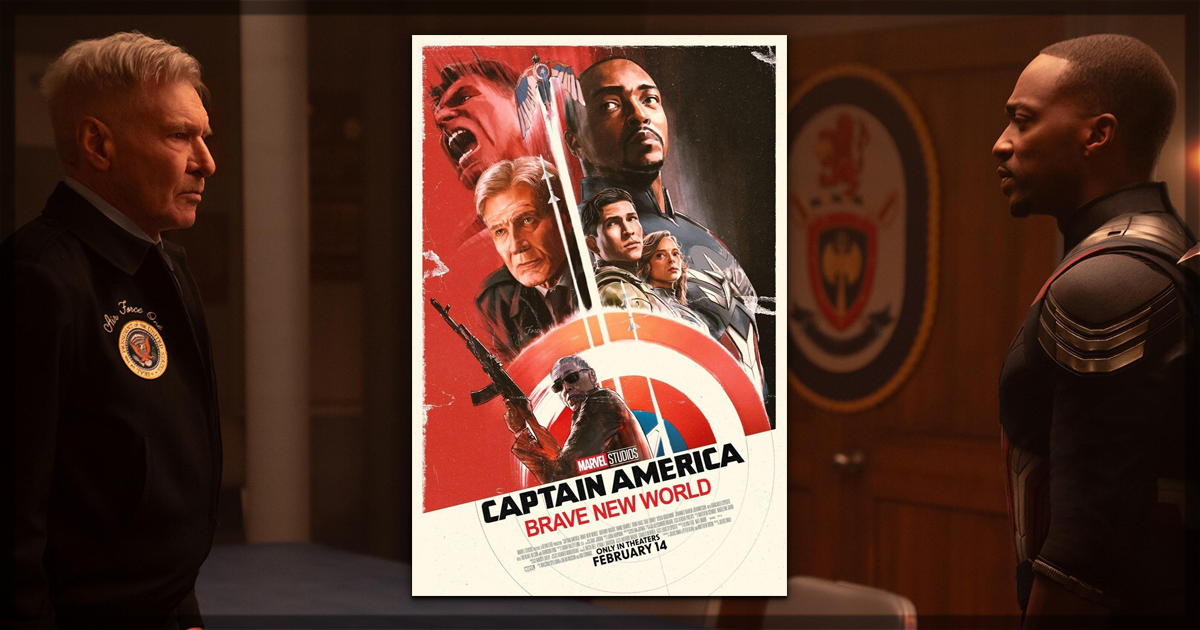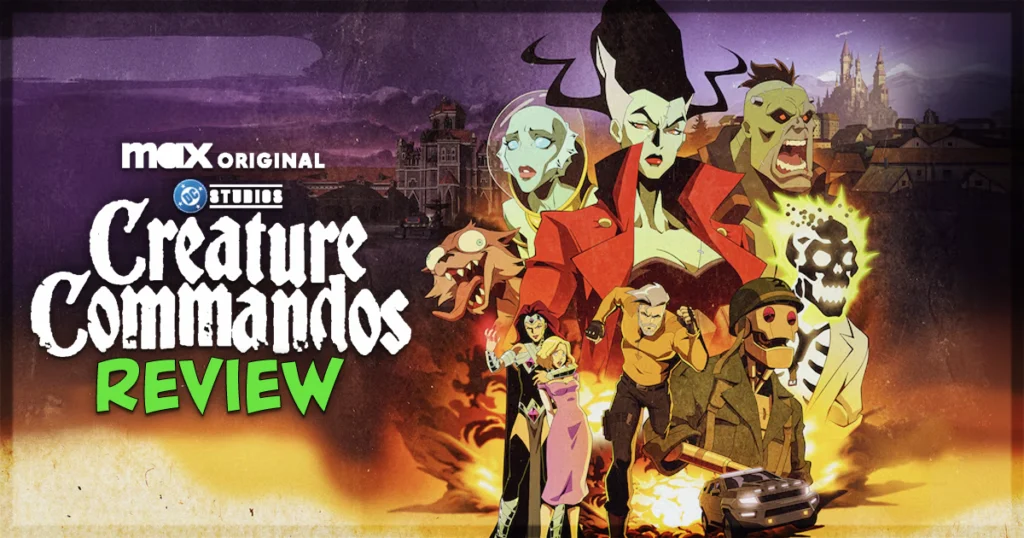The post-Endgame era of the Marvel Cinematic Universe (MCU) has been inconsistent and marked by numerous production issues, so the fact that Captain America: Brave New World is yet another project affected by reshoots and multiple script revisions isn’t at all surprising. It only reinforces the general concern surrounding the state of the franchise that dominated the past decade and a half. Personally, most of the recent films and series have been received positively, but I must admit the lack of truly memorable movies that become frequent picks in “best of the year” lists and the like.
Captain America: Brave New World is the penultimate installment of Phase Five and boasts an extensive team of writers – Rob Edwards (Treasure Planet), Malcolm Spellman & Dalan Musson (The Falcon and the Winter Soldier), Julius Onah (The Cloverfield Paradox), and Peter Glanz – with Onah also taking on directing duties. And there are still a few uncredited names who contributed to the rewrites. Naturally, the story follows the new Captain America, Sam Wilson (Anthony Mackie), as he reencounters Thaddeus Ross (Harrison Ford), the newly elected President of the United States. Sam finds himself at the center of an international incident, forced to uncover the reasons behind a global conspiracy before it’s too late and the world ends up seeing… red.
Declaring that the Captain America trilogy is the best in the MCU is quite common, and if it’s not a unanimous opinion, it certainly comes close. However, this fourth installment not only exists in an entirely different context than the previous three, but the titular hero has also changed in name, personality, and even some moral and ethical principles. Those who watched the corresponding series – which is practically mandatory for anyone wanting to stay truly up-to-date with current events and new characters – will recognize the main themes presented in Brave New World.
From the responsibility and power of a symbolic and inspirational role to personal identity, genuine redemption, and complex issues related to criminal justice – not to mention prominent topics of legacy and race – Captain America: Brave New World touches on all these subject matters. But contrary to its title, it lacks the courage and groundbreaking elements needed to stand out, playing it safe with its messages and offering only surface-level explorations of the themes generated by various storylines.
In a film with multiple narrative threads carrying varying weights of politics, society, and even activism, Captain America: Brave New World struggles to hide its well-documented production issues. These led to several noticeable reshoots throughout the film, negatively impacting the pacing, tone, and overall structural control of a narrative that interconnects too many isolated events that don’t always blend together as smoothly as they should. That said, it’s rather surprising how decent the final product is, thanks largely to a fantastic cast, a highly energetic third act packed with captivating action, and – ironically, given the messy scripting process – it’s actually one of the MCU flicks that resolves the most “loose ends” across its runtime.
If there were still any doubts about Sam Wilson / Anthony Mackie being the right choice to take up the shield left behind by Steve Rogers / Chris Evans, Captain America: Brave New World crushes any arguments against the former. Mackie proves he’s more than capable of leading a blockbuster of this importance to the franchise, impressing with a presence that’s both similar to and distinct from his predecessor. The actor maintains the essence of what Captain America represents while bringing his own style and perspective to the position. His chemistry with Danny Ramirez (Top Gun: Maverick), who plays the new Falcon, Joaquin Torres, is reminiscent of the Steve-Bucky / Evans-Stan duo, but once again, both actors bring their own unique dynamics to the big screen, separating themselves from the relationship that defined an entire era in Marvel history.
Harrison Ford (Indiana Jones) steps in to replace the late William Hurt as Thaddeus Ross, delivering a performance that’s both respectful and worthy of the original actor’s work. In fact, Ford brings more emotional depth than expected, fulfilling the sentimental demands of what is arguably Brave New World‘s most expanded character arc. Still, the movie falls short in depth and the presence of Betty Ross (Liv Tyler) – it’s odd for such an important character in the story’s development to have only one physical scene.
A better-handled return is that of Tim Blake Nelson as Samuel Sterns, the scientist responsible for creating the Abomination in The Incredible Hulk. That film was the last time the character was seen, as he was contaminated by Bruce Banner’s blood, which entered his brain, granting him superhuman intelligence. Captain America: Brave New World brings the antagonist back in an interesting manner, while also using the opportunity to reference and fix certain MCU questions lying around for years – such as the emergence of the Celestial Tiamut in Eternals or the current status of the Avengers. This is sure to please fanatics who can’t go a month without seeing something referenced in the next project.
Despite its pacing issues and some noticeably rough green-screen effects, especially toward the end, Captain America: Brave New World delivers an immersive third act where the visual work on Red Hulk deserves praise, as does the choreography in the subsequent action sequences – though, personally, I consider the set piece in the Celestial’s location in the second act to be the most climactic, entertaining moment of the film. The fact that marketing didn’t conceal Red Hulk’s presence prevents the central mystery from being as intriguing as it theoretically should have been, but in reality, it would have been difficult to promote this movie without at least mentioning him.
Laura Karpman’s (The Marvels) score is possibly the strongest technical highlight, elevating the final act with the necessary energy levels. Kramer Morgenthau’s (Creed III) kinetic cinematography also contributes to the appeal for viewers eager for action. Overall, Captain America: Brave New World doesn’t leave a huge impression – initial tonal comparisons to The Winter Soldier make sense, but its narrative and thematic impact are significantly lower – but it doesn’t deserve the excessive division it has faced during its opening week.
And this is where I’ll take the risk of adding an extra, more meta-critical paragraph. Ever since Avengers: Endgame, there’s been a noticeable shift in the initial reception to new MCU flicks. It’s true that consistency has suffered, but there also seems to be a growing impatience and even a pre-set mindset to doubt upcoming projects, as if half the opinion is already formed before even stepping into the theater. The reasons for this are endless, but the reality is that, in franchises with large fandoms, it’s becoming more and more apparent that there are “teams” whose stance must always be either positive or negative. It’s a strange shift, especially in the world of film criticism, where movies should be judged individually and without external influences. However, given how the industry has evolved alongside the triviality of social media, the expectation is that these behaviors will only intensify.
Final Thoughts on Captain America: Brave New World
Captain America: Brave New World may not reach the high bar set by its direct predecessors, but it’s far from the disaster some claim it to be. Despite its evident production flaws, Julius Onah still manages to deliver moments of real entertainment, supported by a charismatic cast and well-crafted action sequences. Most importantly, Anthony Mackie’s performance as Sam Wilson proves, without a doubt, that he was the right choice to wield the shield left behind by Steve Rogers. The actor perfectly captures the duality of being both a global symbol and a man still searching for his own path, bringing a unique approach to the legacy of the titular hero. It may not be top-tier MCU, but it’s a film worthy of being experienced on the big screen.
Rating: B
Captain America: Brave New World is now playing in theaters.
Learn more about the film, including how to buy tickets, at the official website for the title.


